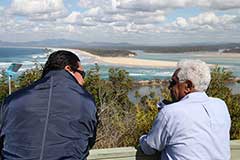Les Malezer
Delegate, United Nations Committee of Indigenous Issues. Co-chair Elect, National Congress of Australia’s First Peoples

1991 can be seen as a benchmark year in the history of black Australia. The launch of Koori Mail in that year is symbolic of the demand at that time for ‘standards’ concerning the rights of the Aboriginal people that had developed over the previous two decades.
In 1985, the collapse in the collaborative attempt for national land rights legislation spurned a new momentum to unite that generation. Aboriginal political activism shifted focus to empower the people rather than continue reliance upon government intentions. From 1989, ATSIC took over the decision-making roles of the Department of Aboriginal Affairs, the Aboriginal Development Commission and certain other statutory bodies. In 1991, the Royal Commission into Aboriginal Deaths in Custody produced a damning indictment of the imprisonment and cruel treatment of Aboriginal people. In 1992, the High Court announced the Mabo decision, finding that the people of Mer in the Torres Strait continued to valid title to their territories ‘as against the world’.
It was at this time that serious steps were taken at the United Nations to develop a human rights standard for the indigenous populations of the world. In 1989, the Indigenous and Tribal Peoples Convention was formally adopted by the International Labour Organisation as ILO Convention No. 169, but Indigenous Peoples delegations rejected this treaty because it did not recognise their rights to self-determination. However, by 1993 the UN Working Group on Indigenous Populations had completed the draft of the proposed Declaration on the Rights of Indigenous Peoples and the document was entered into negotiations within senior UN bodies. Australian Aboriginal delegations participated in these international forums but it was with the advent of ATSIC that serious work occurred to conclude an international standard.
The Koori Mail was, at that time, the main medium in Australia for positively promoting the draft Declaration amongst the Aboriginal and Torres Strait Islander population. From 2003, the negotiations at the United Nations on the rights of Indigenous Peoples were at their peak. The critical issues of self-determination, and lands and resources were being constantly debated. Some States strongly resisted these specific rights and the concept of ‘collective’ rights held by ‘peoples’. These debates were reported by the Koori Mail. Our Aboriginal and Torres Strait Islander population were being kept informed of the issues and, in particular, the strong opposition to rights being mounted by the Howard Government of Australia.
In 2005, ATSIC was abolished. I am convinced that it was the international fight for rights that ultimately led to the government’s decision to bring ATSIC into disrepute and end ATSIC support for the Declaration by Aboriginal and Torres Strait Islander delegations. Thankfully, Koori Mail was there to record this and later parts of the history, as we remember Australia’s vote against the Declaration at the UN General Assembly, and as we take some satisfaction from the defeat of the Howard Government at the federal elections two months later. Koori Mail was on hand to report the formal announcement by the Rudd Government, in 2009, that the Government was now in support of the UN Declaration on the Rights of Indigenous Peoples. We can be proud of this historical period.
The 20 successful years of the Koori Mail from 1991 to 2011 also represents a significant 20-year struggle in Australia for our inherent rights to finally become entrenched in a strong universal human rights standard.




